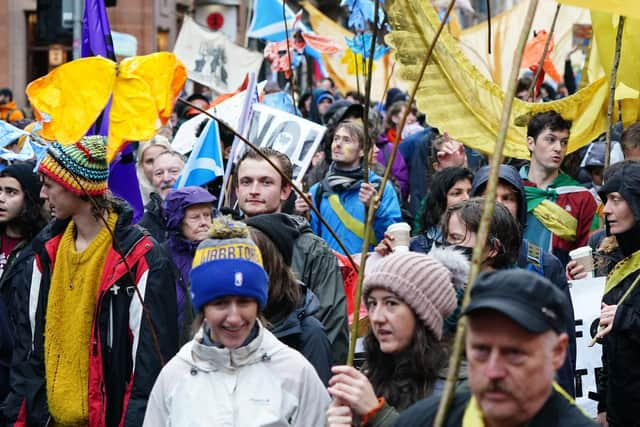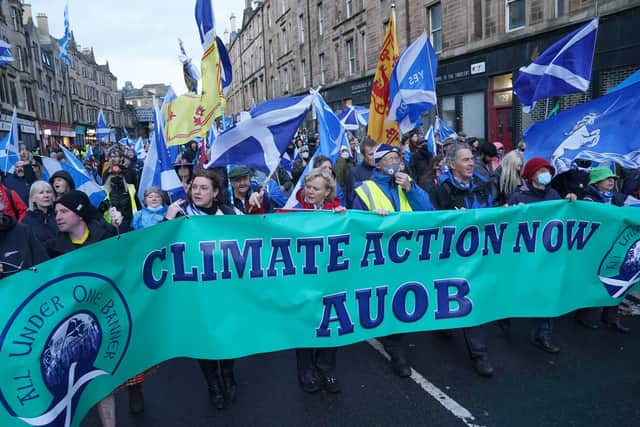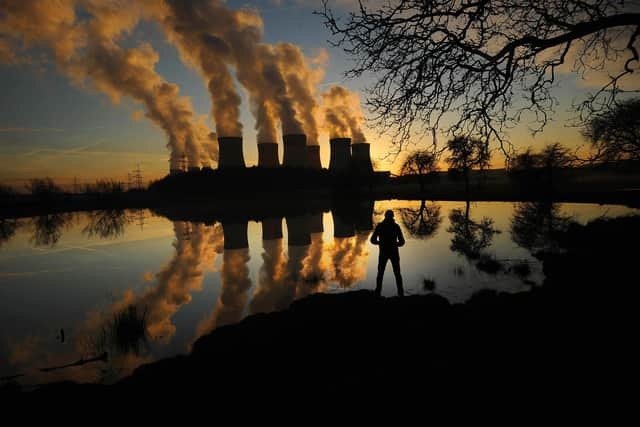COP26: A Yorkshire climate activist’s view from summit and challenge to Drax – Daniel Willis
Attending the talks as a civil society observer for the first time this year, I was struck by the fast pace of change and wall-to-wall media attention on the talks.
Advertisement
Hide AdAdvertisement
Hide AdBut a big challenge remains in terms of how the significance of the talks, and what they will mean for people’s everyday lives, will be communicated to the wider public.


The COP (a meeting between countries signed up to the United Nations convention on climate change) is a place where global targets and frameworks are set.
The decisions made this week will not immediately impact the lives of the public – that’s down to how our national and local governments interpret these agreements. But that doesn’t mean that what’s been agreed this week won’t have impacts in the long term.
Advertisement
Hide AdAdvertisement
Hide AdWe have seen a wave of pledges to cut end deforestation, cut methane emission, and shift public and private sector finances away from fossil fuels into renewable energy. Yet, right now, many of these remain just pledges without firm plans behind them.


In the months and years to come, plans to cut carbon emissions from coal power and stop deforestation could have a big impact here in Yorkshire, not least because of the Drax power plant.
Drax has been called both the UK’s most polluting project and Europe’s biggest green experiment, as it gradually shifts from burning coal to create electricity to burning biomass (natural products like wood) instead. But groups have criticised the station for actually increasing its emissions and for contributing to deforestation by burning materials that come from trees.
As the Government tries to implement pledges made at COP, it is really important that a plan is put in place that quickly reduces Drax’s contribution to climate change, and cuts its contribution to deforestation, without resulting in job losses.
Advertisement
Hide AdAdvertisement
Hide AdOne way of guaranteeing this would be for the Government to engage more closely with local communities in Yorkshire, to provide funds and retraining programmes to support workers, and to develop more green energy projects across the county.


By doing this, the UK can meet its international commitments agreed with some of the countries most affected by climate change at COP26, without forcing the costs onto families and communities.
Another important way of supporting communities while reducing emissions from fossil fuels is to develop low carbon public transport. Yorkshire can be a difficult region to travel across easily without a car, so improving and expanding our public transport infrastructure while ensuring it runs on clean energy could be good for both people and planet.
Significant public investment in public transport can also reduce the costs of using it, meaning that more people are freely able to travel and work across the region.
Advertisement
Hide AdAdvertisement
Hide AdSimilarly, we should invest in developing cycling infrastructure and make our cities easier to walk around, a process that needs to involve (and in some towns already is doing) proper public consultation and engagement. Done right, these changes won’t just help us tackle climate change, they will also support the economic development of the region.
Having a positive vision of how tackling climate change might improve all of our lives is essential for reducing the global impacts of global warming while keeping the public onside.
Many in the climate justice movement would call this a “just transition” – meaning a shift to more sustainable ways of living while improving our lives and achieving justice for all.
With more public transport, green jobs and a greater emphasis on caring for our families and green spaces, we would have more time and resources to enjoy life and spend time with our families and friends.
Advertisement
Hide AdAdvertisement
Hide AdIt was heartening to see thousands of people in Leeds, York, Sheffield and across the UK march in support of this kind of positive vision.
Of course, the costs of creating this kind of change, while reducing carbon emissions and supporting low income countries through extreme weather, droughts and floods, will be significant. But they will still be far less than the costs of not taking action at all.
That is why the coming weeks and months after COP26 will be critical.
Daniel Willis lives in Huddersfield and campaigns for climate justice at Global Justice Now.
Advertisement
Hide AdAdvertisement
Hide AdFollowing publication of this column, Drax media spokesperson Aidan Kerr contacted The Yorkshire Post to point out: “Drax does not contribute to deforestation. Not contributing to this practice is a fundamental part of our sourcing rules.
“We are committed to using fibre from areas where the forests are growing at a greater rate than what is harvested, indeed forests in the US South have doubled in growth since the 1950s.
“Our Catchment Area Analyses look at the different dynamics of each forest to track how forests are growing, and what they are being used for. On the basis of this evidence we can demonstrate that Drax’s sourcing practices do not cause deforestation, forest decline or carbon debt.
“This is a fundamental commitment in our responsible sourcing policy and supported by evidence on the ground. Information about the health of the forests where we source from, such as all our Catchment Area Analyses, are available online.”
Advertisement
Hide AdAdvertisement
Hide AdSupport The Yorkshire Post and become a subscriber today. Your subscription will help us to continue to bring quality news to the people of Yorkshire. In return, you’ll see fewer ads on site, get free access to our app, receive exclusive members-only offers and access to all premium content and columns. Click here to subscribe.
Comment Guidelines
National World encourages reader discussion on our stories. User feedback, insights and back-and-forth exchanges add a rich layer of context to reporting. Please review our Community Guidelines before commenting.